九年级英语 Unit 2 Body language知识精讲 北京课改版
- 格式:pdf
- 大小:117.34 KB
- 文档页数:5


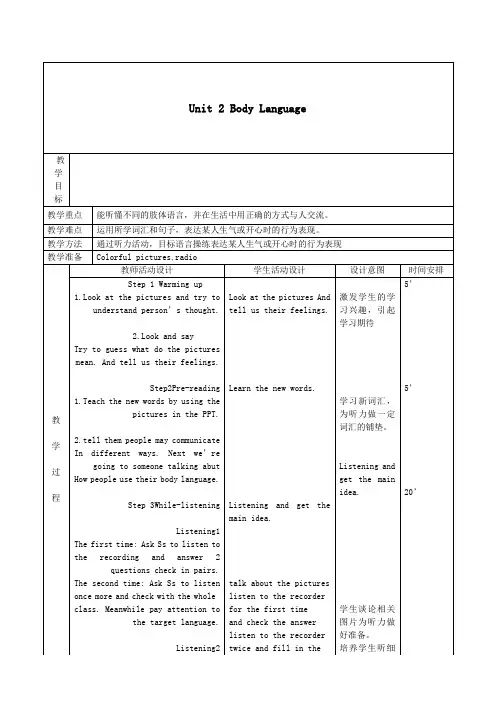
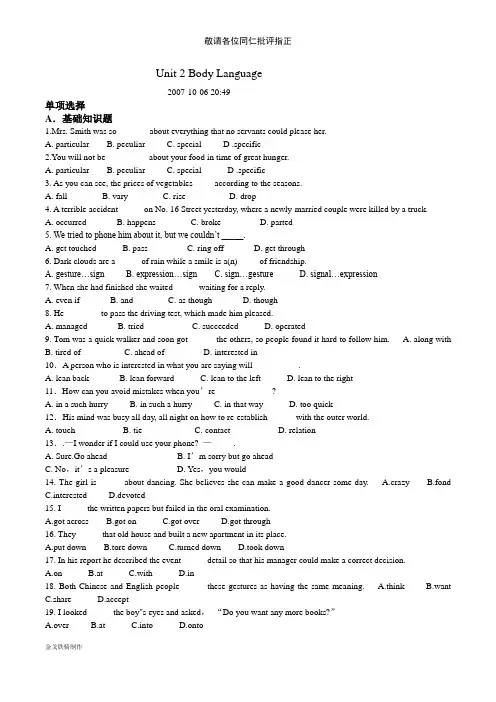
Unit 2 Body Language2007-10-06 20:49单项选择A.基础知识题1.Mrs. Smith was so _______about everything that no servants could please her.A. particularB. peculiarC. special D .specific2.You will not be _________ about your food in time of great hunger.A. particularB. peculiarC. special D .specific3. As you can see, the prices of vegetables ____ according to the seasons.A. fallB. varyC. riseD. drop4. A terrible accident _____ on No. 16 Street yesterday, where a newly-married couple were killed by a truck.A. occurredB. happensC. brokeD. parted5. We tried to phone him about it, but we couldn’t _____.A. get touchedB. passC. ring offD. get through6. Dark clouds are a _____ of rain while a smile is a(n) ____ of friendship.A. gesture…signB. expression…signC. sign…gestureD. signal…expression7. When she had finished she waited _____ waiting for a reply.A. even ifB. andC. as thoughD. though8. He ________to pass the driving test, which made him pleased.A. managedB. triedC. succeededD. operated9. Tom was a quick walker and soon got ______the others, so people found it hard to follow him. A. along withB. tired ofC. ahead ofD. interested in10.A person who is interested in what you are saying will __________.A. lean backB. lean forwardC. lean to the leftD. lean to the right11.How can you avoid mistakes when you’re_____________?A. in a such hurryB. in such a hurryC. in that wayD. too quick12.His mind was busy all day, all night on how to re-establish ______with the outer world.A. touchB. tieC. contactD. relation13..—I wonder if I could use your phone? —_____.A. Sure.Go aheadB. I’m sorry but go aheadC. No,it’s a pleasureD. Yes,you would14. The girl is _____ about dancing. She believes she can make a good dancer some day. A.crazy B.fondC.interestedD.devoted15. I _____ the written papers but failed in the oral examination.A.got acrossB.got onC.got overD.got through16. They _____ that old house and built a new apartment in its place.A.put downB.tore downC.turned downD.took down17. In his report he described the event _____ detail so that his manager could make a correct decision.A.onB.atC.withD.in18. Both Chinese and English people _____ these gestures as having the same meaning. A.think B.wantC.shareD.accept19. I looked _____ the boy"s eyes and asked,“Do you want any more books?”A.overB.atC.intoD.onto20. I feel _____ today.There is so much bad news coming from all parts of the country.A.upB.downC.overD.off21.._____ I admit that the problems are difficult,I don"t agree that they cannot be solved. A.UnlessB.UntilC.WhileD.Since22. ------Would you mind my telling him the news? --------_____________.A. Yes, pleaseB. Never mindC. It doesn’t matterD. No, go ahead23. After a long discussion, both sides agreed ______ the price of the products.A.withB. forC. onD. to24. I wonder if you will____ what she said.A. agree aboutB. agree withC. be agree onD. be agree with25. He was _____ head when his grandma saw him .A. patted on theB. patted on hisC. patted in theD. patted in his26._______ I understand your opinion,I don’t agree with you.A. WhileB. AlthoughC.WhenD. A,B and C27. The city is going to ________ those old houses and put up a new shopping center.A. tear downB. turn awayC. tear offD. tear up28.---- What do you think of the book? ---- _____.A.You are worth to read B.You are worth readingC.It is worth reading the book D.The book is worth reading29. How much _____?A.the book is worth B.the book isC.does the book cost D.the book costs30. When he ran down the stairs, he tried to avoid ____ by the teacher.A. being seenB. seeingC. to be seenD. to see31. He didn't join us in playing the game because he was _____climbing the hill.A. tired ofB. tired fromC. tiring ofD. tiring from32. ---How many bridges can you see____ the river? --________A. on, NoneB. over, NoneC. on , No oneD. over, No oneB: 技能、技巧及拓展思维题1. We thought of selling this old furniture, but we’ve decided to ______it. It might be valuable. A. hold on toB. keep up withC. turn toD. look after2. ---How do you deal with the disagreement between the company and the customers?---The key _______the problem is to meet the demand ______ by the customers.A. to solving; makingB. to solving; madeC. to solve; makingD. to solve; made3. Would you ____ do me a favor when I move to the new house?A.be kind B.be so kind C.be so kind as to D.be as kind as4. We have not decided _____ there by bus or on foot.A. to getB. gettingC. if to getD. whether to get5. Lucy spent as much time as she _____ over her lessons.A. could goingB. wentC. could goD. could to go6. While shopping, people sometimes can’t help _____ into buying something unwanted.A. to persuadeB. persuadingC. being persuadedD. be persuaded7. I would love______ to the party last night but I have to work extra hours to finish a report.A. to goB. having goneC. goingD. to have gone8. ------What do you think of the meal?-----Although some dishes don’t agree _______me, it’s really a nice meal.A. onB. toC. withD. for9. My father was so glad to meet his old friend again. You see, they ______with each other for nearly years.A. lost contactB. had lost contactC. had been out of contactD. has been out of contact10. If you _______when he is in trouble, he will always appreciate you.A. give him a handB. tear him downC. make fun of himD. take possession of him11.He managed to make himself _____ with his ______ English .A. understood , breakingB. understand , brokenC. understand , breakingD. understood , broken12. Take your own , don’t take anyone ______ by mistake .A. moreB. else’s D. else’ D. else13. She ____ her boyfriend goodbye when she was on the ship .A. wavedB. kissedC. saidD. gave14. I will spend as much time as I can ______ you with your English .A. helpB. for helpC. helpingD. to helping15.He can't help ______ his brother's homework, for he is busy preparing for the exam.A. doingB. to doC. to doingD. for doing16. As I _____ him my thanks, he held my hand firmly, ______ my eyes and smiled.A. showed to , looked intoB. expressed , looking intoC. showed, looking atD. expressed to , looked into17. Such a person______.A. is not worth being knownB. doesn't worth being knownC. doesn't worth knowingD. is not worth knowing18. I can't think of ____ alone any longer.A. you livingB. you liveC. you to liveD. you are living19. he teacher praised him for the way ____ he thought of ____ the problem.A. in which, to settleB. in which, settlingC. which , to settleD. which , settling20. He is so ____ that his parents are very ____.A. disappointing. worriedB. disappointed, worriedC. disappointing, worryingD. disappointed, worrying21. Helen is always the first _____ and the last _____.A. to come , leaveB. comes , leavesC. come, leaveD. to come , to leave22. Do let your mother know all the truth. She appears _______ everything.A. to tellB. to be toldC. to be tellingD. to have been told23. China has a ____ population than____ in Africa.A. more, any other countryB. more, any countryC. larger, any countryD. larger, all the other countries24. Suddenly they found a light ____ . So they _____ to walk on.A. ahead of, were encouragedB. ahead of , had been encouragedC. ahead , were encouragedD. ahead, had been encouraged25. I ______ the written papers but failed in the oral examination.A. got acrossB. got onC. got overD. got through26. He is now at college and on the way to _________a doctor.A. becomeB. becomingC. beD. being27. I have lost one of my gloves. I _______ it somewhere.A. must dropB. must have droppedC. must be droppingD. must have been dropped28. He ______have completed his work; otherwise, he wouldn’t be enjoying himself by seaside. A. shouldB. mustC. wouldn’tD. can’t句型转换完成B句,使其与A句意思相同或相近。
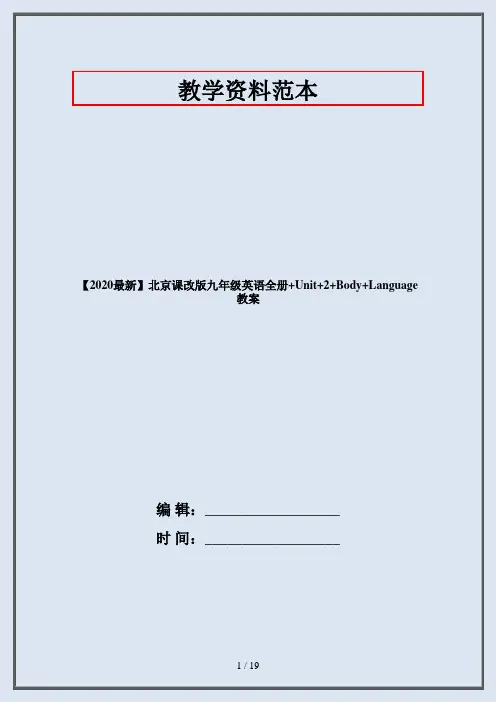
教学资料范本【2020最新】北京课改版九年级英语全册+Unit+2+Body+Language教案编辑:__________________时间:__________________一、教学内容:Unit Two Body Language二、教学目标知识目标:熟练掌握本单元课文中的单词,短语和句型。
能力目标:培养学生的综合运用知识的能力。
三、教学难点:培养学生的综合能力四、重点知识:单词:本单元所有单词(单词表中)短语:1) tone of voice 说话的语气2) facial expression 面部表情3) disagree with… 不同意某人的观点4) be angry with sb.. 生某人的气5) tend to do sth.. 倾向于做某事6) by reading the body 通过观察肢体语言7) even though 即使8) all the time 一直,始终9) nod one’s hea d 点头10) stay close to each other 彼此靠近11) shake hands with sb.. 与某人握手12) back and forth 来回地13) cross one’s legs 跷二郎腿14) in order to do sth.. 为了做某事15) avoid doing sth.. 避免做某事16)in public 在公共场所17) more than half of 多数……18) care less about 不在意19) kiss on both cheeks 吻在双颊上20) pretend to do sth.. 假装做某事五、重点知识讲解:1.. Do you know body language? Do you know that more than half of our ideas or feelings are expressed by our tone of voice, our facial expressions, our gestures and the way we position our body when we speak? We can read the mind by understanding these non-verbal messages..译文:你了解肢体语言吗?你知道我们的多数想法或感情都是由我们说话时的语气、面部表情、手势和身体的姿势所表达的吗?我们可以通过这些非言语的信息来理解人的心思。
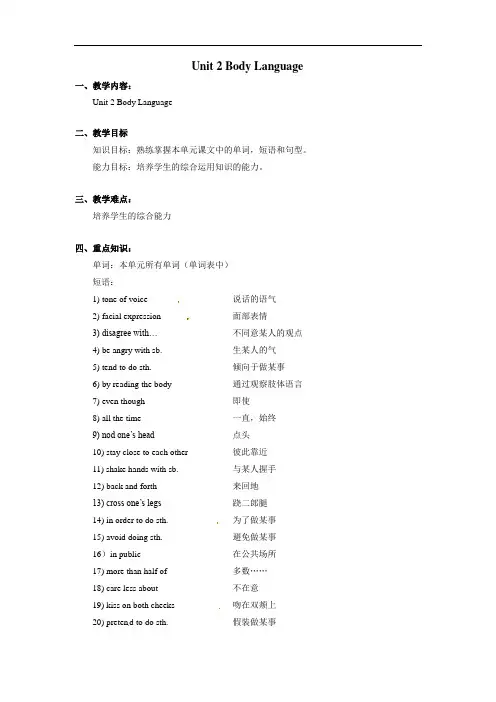
Unit 2 Body Language 一、教学内容:Unit 2 Body Language二、教学目标知识目标:熟练掌握本单元课文中的单词,短语和句型。
能力目标:培养学生的综合运用知识的能力。
三、教学难点:培养学生的综合能力四、重点知识:单词:本单元所有单词(单词表中)短语:1) tone of voice 说话的语气2) facial expression 面部表情3) disagree with…不同意某人的观点4) be angry with sb. 生某人的气5) tend to do sth. 倾向于做某事6) by reading the body 通过观察肢体语言7) even though 即使8) all the time 一直,始终9) nod one’s head 点头10) stay close to each other 彼此靠近11) shake hands with sb. 与某人握手12) back and forth 来回地13) cross one’s legs 跷二郎腿14) in order to do sth. 为了做某事15) avoid doing sth. 避免做某事16)in public 在公共场所17) more than half of 多数……18) care less about 不在意19) kiss on both cheeks 吻在双颊上20) preten d to do sth. 假装做某事五、重点知识讲解:1. Do you know body language? Do you know that more than half of our ideas or f eelings are expressed by our tone of voice, our facial expressions, our gestures and the way we position our body when we speak? We can read the mind by understanding these non-verbal messages.译文:你了解肢体语言吗?你知道我们的多数想法或感情都是由我们说话时的语气、面部表情、手势和身体的姿势所表达的吗?我们可以通过这些非言语的信息来理解人的心思。
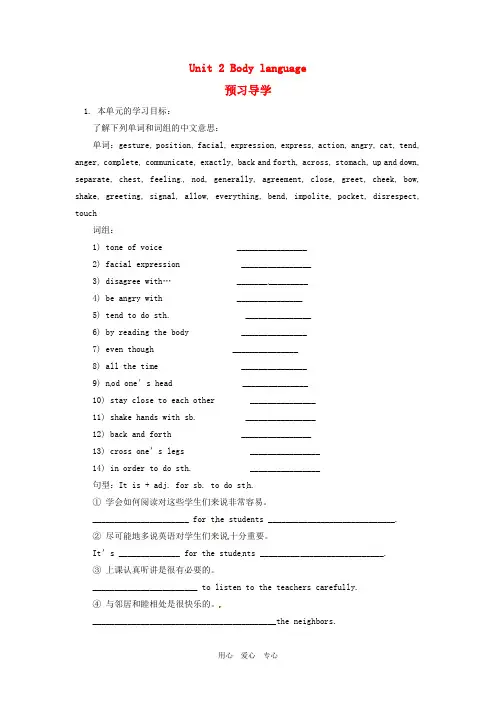
Unit 2 Body language预习导学1. 本单元的学习目标:了解下列单词和词组的中文意思:单词:gesture, position, facial, expression, express, action, angry, cat, tend, anger, complete, communicate, exactly, back and forth, across, stomach, up and down, separate, chest, feeling, nod, generally, agreement, close, greet, cheek, bow, shake, greeting, signal, allow, everything, bend, impolite, pocket, disrespect, touch词组:1) tone of voice ________________2) facial expression ________________3) disagree with… ________________4) be angry with _______________5) tend to do sth. _______________6) by reading the body _______________7) even though _______________8) all the time _______________9) n od one’s head _______________10) stay close to each other _______________11) shake hands with sb. ________________12) back and forth ________________13) cross one’s legs ________________14) in order to do sth. ________________句型:It is + adj. for sb. to do st h.①学会如何阅读对这些学生们来说非常容易。
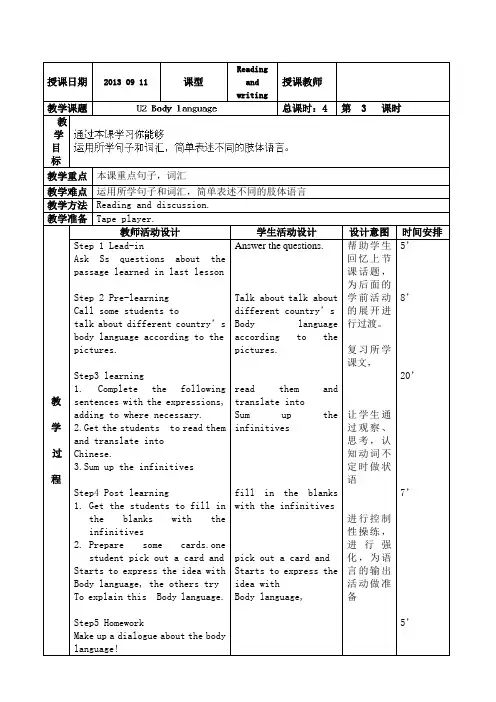
授课日期2013 09 11课型Readingandwriting授课教师教学课题总课时:4 第 3 课时教学目标教学重点本课重点句子,词汇教学难点运用所学句子和词汇,简单表述不同的肢体语言教学方法Reading and discussion.教学准备Tape player.教学过程教师活动设计学生活动设计设计意图时间安排Step 1 Lead-inAsk Ss questions about thepassage learned in last lessonStep 2 Pre-learningCall some students totalk about different country’sbody language according to thepictures.Step3 learning1. Complete the followingsentences with the expressions,adding to where necessary.2.Get the students to read themand translate intoChinese.3.Sum up the infinitivesStep4 Post learning1.Get the students to fill inthe blanks with theinfinitives2.Prepare some cards.onestudent pick out a card andStarts to express the idea withBody language, the others tryTo explain this Body language.Step5 HomeworkMake up a dialogue about the bodylanguage!Answer the questions.Talk about talk aboutdifferent country’sBody languageaccording to thepictures.read them andtranslate intoSum up theinfinitivesfill in the blankswith the infinitivespick out a card andStarts to express theidea withBody language,帮助学生回忆上节课话题,为后面的学前活动的展开进行过渡。
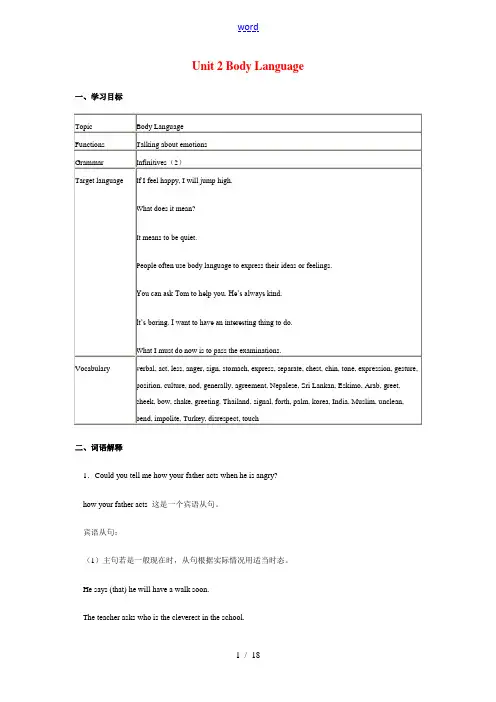
Unit 2 Body Language 一、学习目标二、词语解释1.Could you tell me how your father acts when he is angry?how your father acts 这是一个宾语从句。
宾语从句:(1)主句若是一般现在时,从句根据实际情况用适当时态。
He says (that) he will have a walk soon.The teacher asks who is the cleverest in the school.I want to know who came here late this morning.(2)主句若是一般过去时,从句也要用过去时。
He wondered if I would e.She told me that her son had got well.She said that she liked watching TV.We thought Jim was wrong.(3)无论主句是何时态,从句若表客观真理,要用一般现在时。
Mr. Li said the moon is smaller than the earth.(4)宾语从句无论有何引导词,都要用陈述句语序。
Could you tell me when you will get back to Wuhan?(不是will you)Do you know which sweater she is wearing? (不是is she)2.By reading the body, we can find when the mind wants to say “no” even though the verbal message is “yes”.通过观察肢体语言,我们会发现,人们虽然嘴上说“是”,心里想的都是“不”。
(1)by的用法①表示位置:“在……旁边,靠近……”,表示此意时,常可与beside换用。
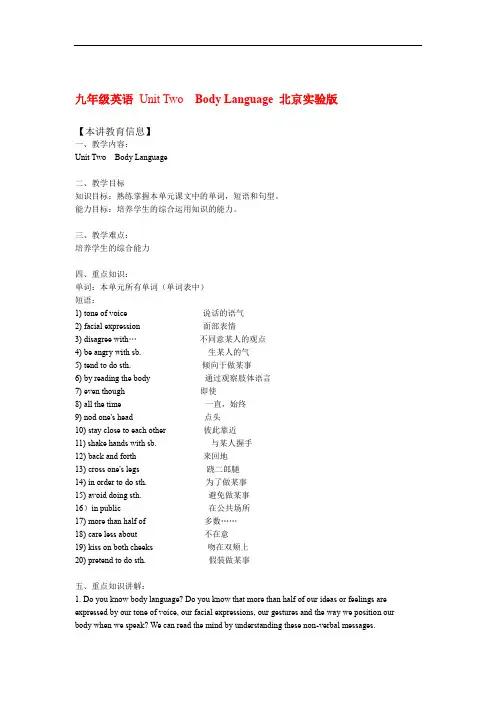
九年级英语Unit Two Body Language 北京实验版【本讲教育信息】一、教学内容:Unit Two Body Language二、教学目标知识目标:熟练掌握本单元课文中的单词,短语和句型。
能力目标:培养学生的综合运用知识的能力。
三、教学难点:培养学生的综合能力四、重点知识:单词:本单元所有单词(单词表中)短语:1) tone of voice 说话的语气2) facial expression 面部表情3) disagree with…不同意某人的观点4) be angry with sb. 生某人的气5) tend to do sth. 倾向于做某事6) by reading the body 通过观察肢体语言7) even though 即使8) all the time 一直,始终9) nod one's head 点头10) stay close to each other 彼此靠近11) shake hands with sb. 与某人握手12) back and forth 来回地13) cross one's legs 跷二郎腿14) in order to do sth. 为了做某事15) avoid doing sth. 避免做某事16)in public 在公共场所17) more than half of 多数……18) care less about 不在意19) kiss on both cheeks 吻在双颊上20) pretend to do sth. 假装做某事五、重点知识讲解:1. Do you know body language? Do you know that more than half of our ideas or feelings are expressed by our tone of voice, our facial expressions, our gestures and the way we position our body when we speak? We can read the mind by understanding these non-verbal messages.译文:你了解肢体语言吗?你知道我们的多数想法或感情都是由我们说话时的语气、面部表情、手势和身体的姿势所表达的吗?我们可以通过这些非言语的信息来理解人的心思。

Unit 2 Body Language辞汇学习一、翻译以下词语tone 手势姿势,位置facial 表达,表情n. 表达v.动作,行为动气的行动,产生行为趋向anger emotion完成沟通,交流exactly胃部分开,分离胸口chin 情感,感觉verbal颔首通常地一致,同意接近地,靠近地打招呼cheekbow 摇动,晃动招呼,问候n. signal palm 许诺每件事物bend 不礼貌的口袋disrespect 触摸,接触英国人Korea German Asian来回地,前前后后地上上下下地辞汇扩展1.closeHe’s my close friend. Close the door, please.Don’t stay close to each other.2.positionWe can express our feelings by the way we position our body.I can find the position of Beijing on a map.He is sitting in a comfortable position.Part 1预习:一、翻译以下词语sign 猜不同的语言手移动交叉,穿过嘴饱了饿,饥饿手指动气安静的说高声地展现交流tone of voice the way one movesfacial expressions the position of one's body What if...American Indians used to do thi nk ofmake signs with hands the shape of a cup in front of 肢体语言,躯体语言变成白色tend to If I were..., I would...二、What can you do if you are happy/angry?课堂导学课堂练习一、回答以下问题1. What are the speakers talking about?A. American Indian's languageB. American Indian's body languageC. A foreign language2. What can we learn from the dialogue?A. American Indians make signs to understand each othersB. Americans make signs to communicateC. The speakers know American Indian's body language in today's English class.二、完成对话A: Can you guess what American Indians used to communicate when they spoke different languages? B: If I were they, I would think of using ______________.A: That's exactly what they did.When one group of American Indians met another group, they had to make signs with_________________________ to understand each other.B: Do you know some of their signs?A: Yes.I learned some in today’s ______________________. See,If they were hungry,they would move the right hand back and forth across the stomach.If they wanted to express, "Let's eat" ,they would make the right hand in the shape of ____________ and move it up and down in front of the mouth.B: What if they were full?A: If they were fu ll, they would separate the ______________finger and the one next to it ,and move the hand from the chest to the chin.三、用If I were..., I would...造句Eg. If I were you, I would try to talk to others.一、回答以下问题1. What's the conversation mainly about?A. The students' parentsB. Body languageC. The students' hobbies2. What can you learn from the conversation?A. When Grace’s father is angry, his face turns red.B. When Yanglin’s father is angry, he speaks less.C. When Lili’s father is angry, he speaks loudly.Unit 2 Part 2 (1) 预习翻译词组1. more than half of our ideas__________________2. tone of voice_________________3. our facial expressions_________________4.non-verbal message_____________5. in different cultures ___________________6. to show agreement__________________7. stay close to each other _____________________8. greet by kissing on both cheeks _______________________9. shake hands___________________10. to signal a person to come near__________________ 11. palm down/ up__________________12. cross one’s legs______________________13. hand everything with both hands to show their respect__________________________14. a sign of disrespect___________________________15. touch the head of another person______________________课堂导学一、Read the passage and answer the question1、What is the passage about ?__________________________________________2、Is there different body language in different countries?_____________________________二、一、What can we learn from the passage?A.When the Muslims are hungry, they will use the left hand.B.Crossing their legs in Korean is polite.C.The Japanese greet by bowing.D.In Thailand, you should hold the palm up and move the fingers towards your body when you wanta person to come near.2 Which one is NOT true in the passage?A.When you bend your finger to a Japanese waiter, maybe he will be angry with you.B. The Muslims think the right hand is clean.C. In some Asian countries, you must not touch the head of another person.D. Nodding one’s head is always meant to show agreement “yes”3、In which countries does “nodding one’s head” mean “no”?_______________________________________________________________________4.How do people greet each other in Arabic countries, ?_____________________________________________________________________________5. In which country do people greet by shaking hands, in Japan or in Thailand?_____________________________________________________________________________6. Does your body speak all the time?____________________________________________________________________表达_________________ 表情__________________动气的_______________ 完成__________________情感_________________ 沟通、交流___________________正、恰恰_____________ 分开、分离_______________通常地_______________ 一致、同意_______________握手________________ 许诺___________每件事物____________ 不礼貌的____________ 礼貌的_____________口袋________________ 不尊重、无礼_____________ 尊重___________触摸________________ 亚洲的_____________Our gesture________________ position our body________________Nod on e’s head____________ stay close to _______________Signal a person to come near__________________Unit2 Part 2 (2)1.stay close to sb2. more than3. all the time4. even though5.care about6. 不是。
Unit 2 Body Language
一、教学内容:
Unit 2 Body Language
二、教学目标
知识目标:熟练掌握本单元课文中的单词,短语和句型。
能力目标:培养学生的综合运用知识的能力。
三、教学难点:
培养学生的综合能力
四、重点知识:
单词:本单元所有单词(单词表中)
短语:
1) tone of voice 说话的语气
2) facial expression 面部表情
3) disagree with… 不同意某人的观点
4) be angry with sb. 生某人的气
5) tend to do sth. 倾向于做某事
6) by reading the body 通过观察肢体语言
7) even though 即使
8) all the time 一直,始终
9) nod one’s head 点头
10) stay close to each other 彼此靠近
11) shake hands with sb. 与某人握手
12) back and forth 来回地
13) cross one’s legs 跷二郎腿
14) in order to do sth. 为了做某事
15) avoid doing sth. 避免做某事
16)in public 在公共场所
17) more than half of 多数……
18) care less about 不在意
19) kiss on both cheeks 吻在双颊上
20) pretend to do sth. 假装做某事
五、重点知识讲解:
1. Do you know body language? Do you know that more than half of our ideas or feelings are expressed by our tone of voice, our facial expressions, our gestures and the way we position our body when we speak? We can read the mind by understanding these non-verbal messages.
译文:你了解肢体语言吗?你知道我们的多数想法或感情都是由我们说话时的语气、面部表情、手势和身体的姿势所表达的吗?我们可以通过这些非言语的信息来理解人的心思。
知识点:
1) more than 多于
2) facial expressions 面部表情
2. By reading the body, we can find when the mind wants to say “no” even though the verbal
message is “yes”. Our body speaks all the time, although it doesn’t mean the same in different cultures.
译文:通过观察肢体语言,我们会发现,即使我们得到的话语信息是“是”,我们也可以得知说话人的真实意思是“不”,我们的肢体时时都在传达信息,尽管在不同文化中,肢体语言所表达的意义有所不同。
知识点:
1) by reading the body 通过观察肢体语言
2) even though 即使
3) all the time 一直,始终
4) although 尽管
3. Nodding one’s head is generally meant to show agreement “yes”, but to Nepalese, Sri Lankans, some Indians and some Eskimos, it means not “yes”, but “no”.
译文:点头一般表示同意,
但对于尼泊尔人,斯里兰卡人,一些印度人和爱斯基摩人来说,点头却不意味着“同意”,而是“不同意”。
知识点:
1) nodding one’s head 点头
2) mean 意味
4. When two Englishmen are talking, they usually don’t stay close to each other, while Chinese people care less about it.
译文:当两个英国人谈话时,他们通常不会离得太近,而中国人则对距离不太在意。
知识点:
1) stay close to each other 相互靠近
2) care less about 不在意
5. Arab people often greet by kissing on both cheeks, in Japan people greet by bowing and in the United States, people shake hands to show their greetings.
译文:阿拉伯人打招呼的方式经常是亲吻双侧面颊,日本人是相互鞠躬,美国人则通过握手来打招呼。
知识点:
1) greet by kissing on both cheeks 通过亲吻双颊来打招呼
2) shake hands 握手
6. In Thailand, if you want to signal a person to come near, you should move the fingers back and forth with palm down, but in the United States, you ask someone to come by holding the palm up and moving the fingers towards your body.
译文:在泰国,如果你想示意一个人走近些,你应该手心朝下,手指合拢前后摆动:而在美国,叫人过来的方式是手心朝上,手指合拢向自己身体的方向移动。
知识点:
1) signal a person to come near 示意某人走近点
2) back and forth 前前后后
3) moving the fingers towards your body 向自己身体的方向移动
7. Crossing one’s legs in the United States is a sign of being relaxed, but in Korea, it’s not allowed.
译文:在美国,跷二郎腿表示放松,在韩国,这样做是不允许的。
知识点:
cross one’s legs 跷二郎腿
8. In China, people hand everything with both hands to show their respect, but in India the Muslims think the left hand is unclean and do not eat or pass something with it.
译文:在中国,人们用双手递送东西,以表示尊重对方。
在印度,穆斯林则认为左手是不干净的,所以他们从不用左手进食或传递东西。
9. If you bend your finger to a German waiter, he will bring you some drink quickly; while a Japanese waiter may be angry with you because it is impolite.
译文:如果你弯动手指向一个德国侍者示意,他会很快为你送来饮料,但这却会惹恼一个日本侍者,因为这样做是不礼貌的。
知识点:
1) If you bend your finger to a German waiter, he will bring you some drink quickly;
如果你弯动手指向一个德国侍者示意,他会很快为你送来饮料;
2) be angry with sb. 生某人的气
3) it is impolite 这是不礼貌的
10. In Turkey, putting one’s hand in one’s pocket is a sign of disrespect. In some Asian countries, you must not touch the head of another person.
译文:在土耳其,把手插在衣兜里是不尊重别人的举止。
在一些亚洲国家,你不能触摸别人的头。
知识点:
1) putting one’s hand in one’s pocket 把手插在衣兜里
2) disrespect 不尊重
11. Remember this body language and remember not to pretend, because your body speaks all the time.
译文:要记住这些肢体语言,还要记住不要假装,
因为你的肢体语言时时都在传达信息。
知识点:
1) remember not to do sth. 记住不做某事
2) pretend (not) to do sth. 假装(不)做某事。